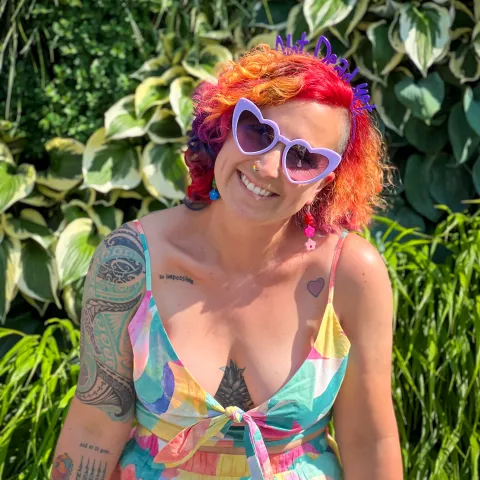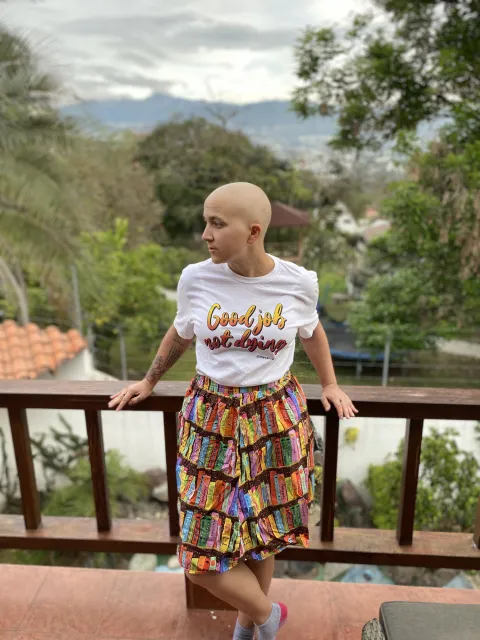
Sara, Canada

Ever since I went to university, well my year of teacher’s college, in Australia, my goal in life, was to teach on every continent, well the ones you can teach on, as I don’t think Antarctica has any schools. I didn’t see any when I was there anyway… Just a lot of penguins.
In 2020, I had just moved to Ecuador from Vietnam, with my partner. I had already lived and taught in Thailand, northern Canada, the Marshall Islands, and Niger, when we accepted jobs in Ecuador. I could write a whole other piece about living abroad in all these countries, but this story isn’t about my life as a teacher or traveler. So I won’t digress, as I tend to do.
I had only been living in Ecuador for about a month before I started to feel off. It started small. I was throwing up, but who doesn’t throw up every now and then, so I didn’t think anything of it. Then came the random nose bleeds, which isn’t normal for me, but I chalked up to the higher altitude living in Quito, not even sure if nose bleeds are a result of that to be honest?
But then came the excruciating pain in my chest. It is hard to describe to you because I had never felt anything like it before. I tried to ignore it, who really wants to go to the doctor for a bit of pain, right? Eventually I couldn’t ignore the pain, and I finally decided to go to a clinic near my house.
That doctor quickly checked my ribs, and asked questions, said I had costochondritis and sent me on my way. Cue me researching everything to do with costochondritis and trying to figure out what to do next. I found myself ordering things suggested by doctors and talking to people who have it, just trying to navigate my life with this new condition.
But that was short lived.
A month later I found myself in so much pain that I couldn’t get up out of bed or off the couch without screaming.
One Tuesday morning in November, as I cried in pain getting up off the couch after my morning coffee, I knew something wasn’t right, and I got my partner, and we rushed to the hospital. Can I just say that I am so thankful he knows Spanish, as navigating an emergency room in a foreign country during a pandemic is not an adventure I suggest for anyone.
Most of my time in the hospital that first day was a blur. My partner spoke for me, asI laid there in pain. The doctors did many tests and scans, and eventually I was in my own private room.
After all the tests, including a bone marrow biopsy… the worst pain by the way, if you know, you know… by Thursday, American Thanksgiving Day, I was diagnosed with multiple myeloma. I had never even heard of this cancer before, so that intensified my state of disbelief.
I was confused, terrified… How could this be happening? I was only 34.
I reached out to my family to share the news and messaged my best friends in Canada right away. Then, I made the decision to post about it on social media.
I’ve always been an open book, even before the age of social media. So, that same day, I let the world know about my diagnosis.
Almost instantly, I was overwhelmed by the outpouring of love and support from family and friends across the globe. I joined online cancer communities filled with the most incredible people and made some amazing friends fast. Connecting with other cancer rebels, as one of my friends in the community Sarah says, who understand what you are going through is something that saved me from despair.
Recently I read this book, called The Resilience Myth, which challenges the common belief that overcoming adversity is solely about being strong and pushing through, often in silence, on your own. When I was going through cancer treatment, I realized just how deeply that myth was ingrained in me. And then people would say things like, "You’re so strong" or “You’re so resilient," as if sheer willpower alone could carry me through the toughest days.
But cancer doesn’t work like that. Not entirely anyways. There were moments when I felt anything but strong; I had moments of fear, exhaustion, and doubt. The truth is resilience isn’t about never breaking down or struggling; it’s about having the support, resources, and permission to be vulnerable along the way. I learned that real strength came from allowing myself to lean on others, to ask for help, and to embrace the fact that it was okay not to be okay all the time.
The myth of resilience often implies that struggle is meant to be faced alone, but my experience taught me the opposite. It was in opening up to my partner, family, friends, and even the broader community that I found the emotional and practical support I needed. Resilience, for me, wasn’t about being tough—it was about being human and letting others help me heal.
And heal me they did. My parents dropped everything within a moment’s notice and came to Quito for 6 weeks to be with me and help us out. My coworkers in Ecuador took turns driving me to chemo appointments. Students and their families, whom I had never met yet outside of virtual teaching, dropped off care packages of food. My best friends were there for me emotionally, even though they were what felt like a million miles away. Friends from all over the globe sent care packages, well wishes, and their love. My partner, Nick, well he did everything and more. I could write a whole other speech on how his love and support got me through this. But I don’t need to say more about him, he knows.
Back to the point, and my story, by March 2021, 3 months since my diagnosis and 5 cycles of chemotherapy, I was in remission. But this wasn’t the end of my treatment. After one more cycle of chemo, I would end up having to fly to Canada, during the pandemic, and undergo my stem cell transplant, which just so happened to be right here at Kingston General Hospital, in July of 2021.
And it was then I had to lean on the support of my family and friends even more. We lived with my parents for many months in Pickering, while I waited for my SCT, and then while I recovered afterwards. My sister would end up driving me to appointments in Oshawa all the time, where my oncologist was. Stopping for donuts along the way of course.
As I went through my SCT outpatient, staying in a hotel near the hospital, it was my partner who carried me (literally and figuratively) through the hardest moments of my life. They told me that those who try to do their SCT outpatient end up with a fever eventually, and to prepare myself to be admitted at any point in the recovery process.
A stem cell transplant is an overwhelming procedure, both physically and emotionally. The toll it takes on the body is immense, and the road to recovery can be long and uncertain. While the science behind the procedure is remarkable, I still don’t fully understand the true magic behind stem cells, and the real challenge comes after—the isolation, the vulnerability, and the constant threat of infection while the immune system rebuilds itself.
Recovering from a stem cell transplant was the most challenging experience I’ve faced, but it was made possible thanks to the resources and support I had access to. Without them, the journey would have been far more isolating and difficult. I made it through my recovery, with daily hospital visits for 13 days after the process, without having to be admitted, before I was released to go back to Pickering. And a month after that, I was told I was healthy enough to fly home to Ecuador.
What made the difference for me was the network of support I had. Access to high-quality medical care was obviously a huge part of that, something every person deserves. But just as important were the emotional resources and support.
First, I don’t think people understand what it means to have a compassionate medical team, like the one I had at Kingston General Hospital for my SCT, as well as the team in Ecuador who led my chemo sessions. And then of course, the unwavering support of family and friends, not just for drives to appointments but to lean on in times of despair. And the love of my partner, without which I don’t think I would have made it through. Physically, maybe, mentally, I don’t know. Knowing that I had people by my side to help manage the highs and lows, to advocate for me, and to give me the space to heal at my own pace, made all the difference.
The myth of resilience might suggest that strength is about pushing through independently, but my recovery was a testament to how crucial it is to have resources and support systems in place. It’s not about facing these tough times alone. Real resilience is built in community, through access to the care, understanding, and resources that give you the chance to heal.
I never would’ve been able to complete my goal of teaching in every continent, which I officially did when I moved to my current home in Slovenia in 2022, without the help and support of my loved ones. I don’t think I would be here writing this now, without that help and support to be honest.
